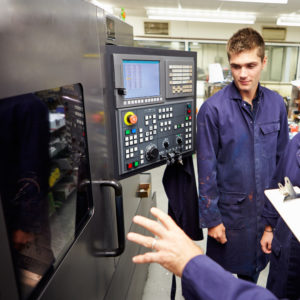We live in a world with an ever-increasing digital presence, and digital technologies for manufacturing are changing the production industry. Lean Manufacturing can revolutionize factory production, increase efficiency, improve production performance, and minimize downtime.
In order to ensure that you are getting the most out of the implementation of Lean Manufacturing principles, you need to have your workforce onboard and working with these adaptations rather than against them. Employee aversion to the implementation of Lean Manufacturing initiatives usually stems from a lack of understanding of how to use them, which can leave them feeling unprepared and unwilling to facilitate the adoption.
Here are some tips to help your workforce understand how to adopt Lean Manufacturing and work as a conduit rather than a barrier to productivity:
What’s the Difference Between Lean and Smart Manufacturing?
Lean Manufacturing is a production method that originated in Japan and seeks to minimize waste and increase productivity in manufacturing processes. Smart manufacturing is the term used to describe a technology-driven approach to the production process whereby internet-connected machines form collaborative manufacturing systems that respond in real-time to meet changing conditions. 
While Smart Manufacturing is a complex multifaceted system that has yet to be fully developed, Lean Manufacturing is already being adopted nationwide in several manufacturing plants. Lean Manufacturing aims to improve efficiency and production performance through the reduction of downtime and the analysis of production data, helping companies to gain better insights into their production processes and create improved production plans.
Lean Manufacturing initiatives are the latest industrial revolution with Smart Manufacturing also developing at a rapid pace, and it is therefore key that manufacturers implement Lean initiatives now to keep up with their competitors. For Lean Manufacturing to be successful, companies will require specially trained members of their staff who understand how to use and keep up with new technologies so as not to hinder the process. Currently one of the biggest barriers to Lean Manufacturing initiatives is a skills gap and shortage.
The Workforce Skills Gap
Many production companies and factories are finding it difficult to implement the latest, more advanced Lean Manufacturing technologies due to a workforce skills gap. Recent research conducted by Deloitte in partnership with The Manufacturing Institute found an overall gap of 3.4 million jobs with more than 60% of them directly linked to a shortage of the necessary talent and required skills for implementation of smart technology.
Furthermore, current workforces are struggling to keep up with the rate of change within their industry, with a report by Accenture finding that 88% of manufacturing executives feel unprepared for the coming disruption as a result of IIoT, and 84% feel that their workforce is not ready to adopt IIoT. Worryingly, this skill gap is projected to widen as technological production replaces human-based production.
How to Address the Gap
To move forward and mitigate the impact of the IIoT skills gap it is clear that a greater level of collaboration between manufacturing leaders across several departments—including IT, HR, and safety and operations managers—is needed.
Plans to install new production lines and implement smart technologies need to be shared between IT staff and engineers, and more communication will be required between multidisciplinary teams if Lean Manufacturing processes are going to be successfully implemented.
Lean Manufacturers must ensure their staff is involved in providing career and technical education to their staff so as to ensure they stay updated on the latest smart manufacturing technologies. Both the knowledge and resources of lead educators must be harnessed to help fill the skills gap.
Implement Better Training
Existing and upcoming factory personnel must be trained to understand how to operate, repair and configure new smart machinery. They should also be provided with the skills they need to carry out diagnostics and digital analysis. Training programs may seem to be an unnecessary expenditure for companies, but they are indeed an investment and an essential factor for the successful implementation of more advanced Lean Manufacturing principles.
Implementing better training and working with education providers to teach about the principles of and skills required to work in Lean Manufacturing is the primary way to fill the IIoT skills gap and to ensure that factories are in a position to adopt new technologies in the future.
Empower Factory Personnel
One primary way to ensure communication is met across departments is to provide all personnel—including machine and manual workstation operators—the means to better control their work by enabling instant communication of issues and access to relevant and actionable data. Done right, this will lead to a culture shift similar to a winning sports team where everybody is aligned and focused on the desired outcome.
Adopt the Right Technology
Lean Manufacturing is only sustainable with the right technology, and so it is vital that companies partner with advanced technology providers such as VersaCall who can offer the very latest Lean Manufacturing systems to help improve their processes.
VersaCall offers different packages with updated features to ensure that they can meet your company’s unique needs. Their teams of experts are on hand to ensure that the implementation of your new system is conducted in such as way that works with your existing production line and minimizes downtime. Contact our experts at VersaCall today to find out more about the ways in which VersaCall’s advanced Andon systems can support your production processes and help your workforce to adopt Lean Manufacturing initiatives.
